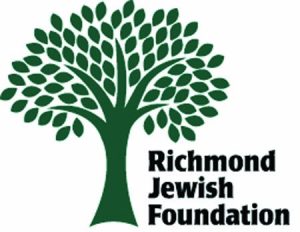 Editor’s Note: In 2014, Susan and Mark Sisisky created the Susan and Mark Sisisky Global Jewish Enrichment Fund at Richmond Jewish Foundation. In a highly competitive process, carefully screened young adult Jewish leaders in Richmond are chosen to travel internationally to learn the important work of the American Jewish Joint Distribution Committee around the world. One of the newest Sisisky Fellow, Cantor Dara Rosenblatt of Temple Beth-El, recently traveled to Morocco and then delivered her experiences via Zoom in a D’var Torah, “Parashat Naso,” during services June 11. The following is her full D’var Torah.
Editor’s Note: In 2014, Susan and Mark Sisisky created the Susan and Mark Sisisky Global Jewish Enrichment Fund at Richmond Jewish Foundation. In a highly competitive process, carefully screened young adult Jewish leaders in Richmond are chosen to travel internationally to learn the important work of the American Jewish Joint Distribution Committee around the world. One of the newest Sisisky Fellow, Cantor Dara Rosenblatt of Temple Beth-El, recently traveled to Morocco and then delivered her experiences via Zoom in a D’var Torah, “Parashat Naso,” during services June 11. The following is her full D’var Torah.
Let’s travel back in time to Shabbat evening at the Ohayon family’s home in Marrakech.
At Shabbat dinner in Morocco we sang songs at the Shabbat table in between courses of delicious Moroccan food. The long table of my new friends looked at me to suggest a song to sing. And immediately I thought of the song.
Od Yavo Shalom aleinu
Val kulam
Salaam aleinu Val kol haolam salaam shalom
Od Yavo shalom aleinu,
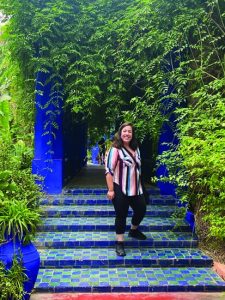
May peace come to us, all of us, sung with the words shalom and salaam, the Hebrew word and the Arabic word for peace, respectively.
In this moment I subconsciously felt the peace and fullness that I was witnessing between the small number of Jews who remain in Morocco and the majority Muslim population. About half way through my immersive experience in Morocco, I was witnessing something that was very special: respect, honor, and camaraderie among Jews and Muslims. This song exemplifies that connection and this moment sums up so much of my experience in Morocco.
Now, let’s take a step even further back to when I landed in Morocco as a participant on this trip with JDC Entwine, a branch of the American Jewish Joint Distribution Committee.
I was excited, and maybe a little bit nervous, but most of all mesmerized. This is a feeling I don’t often have, or at least one I am unable to articulate.
I was mesmerized by being surrounded by other young Jewish professionals, all accomplished, outstanding, and caring individuals (some of whom are listening in on YouTube this morning), and I was mesmerized by the warmth of the welcome that our trip organizers brought with them upon arrival to a place foreign to all of us.
To give you some more background about the organization that planned the trip, the JDC Entwine website states:
“Entwine is building a generation of young Jews who lead and live a life of action with global Jewish responsibility at its core. We offer transformative global service and travel experiences, innovative educational programs, and tailored leadership development opportunities through which young people can explore, find meaning, and take action. Entwine is an initiative of JDC (Joint Distribution Committee), the largest Jewish humanitarian organization in the world.”
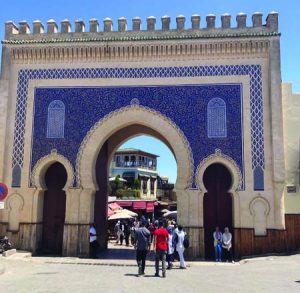 JDC Entwine definitely lives up to its description, as I found this week to be a transformative travel experience and one that I continue to learn from as I reflect on my time in Morocco.
JDC Entwine definitely lives up to its description, as I found this week to be a transformative travel experience and one that I continue to learn from as I reflect on my time in Morocco.
So much of my learning during my time in Morocco was from our amazing tour educator, Raphael Elmaleh. We traveled to three cities, making stops in between each longer journey. First we visited Fez, then Marrakech, and finally Casablanca.
Each city we visited included stops at synagogues and other Jewish sites, such as cemeteries and Jewish-owned shops. There was so much to learn, and I have a lot to share, so I’m going to tell you about one of my favorite days.
One of the most meaningful days was when we traveled outside of Marrakech. First we stopped at the grave and shrine of a Tzadik, or righteous person. All over Morocco are shrines and elaborate graves to righteous Rabbis and also some women, who were known to be pious and wholesome people, whose legacies live on.
In Morocco, Jews and many others, visit these burial sites to honor the memory of these Tzadikim, righteous people. Many of these Tzadikim are also known to have had special powers, and many will visit from all over the world to ask for help or to be healed.
If I remember correctly, we heard about a story of a woman who visited the grave of the Tzadik, Salomon Bel-Hench. This woman was barren and all she wanted and needed was children.
After visiting the Tzadik, she became pregnant. This was just one miracle that took place after a visit to the Tzadik.
The role of the Tzadikim in Morocco is different than in other parts of the world, and their graves and shrines are venerated and cared for by the Jewish community both in Morocco and abroad.
As we exited the grave of the Tzadik, we were given the opportunity to put a candle into the burning furnace. With this candle our hopes, dreams, and requests went along with it. No pressure, after hearing the power of the Tzadik.
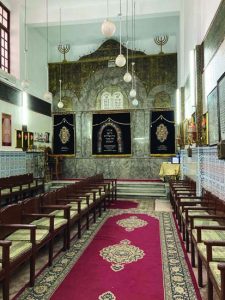
Following the visit to the Tzadik, we drove down the windy street to a Berber village. The Berbers live as I imagine our ancestors did in biblical times, with livestock living among their homes made of brick and mortar, and trade their main source of income. It seems to be a simple life, without the intricacies of modern day living.
Our group spent time with the matriarch of the Berber family, and she made us mint tea.
If you have ever had proper Moroccan Mint Tea, you will know that the process of making it is an art. You put the sugar in, then you add the hot water, then the tea leaves, and then you pour the tea making sure it’s the correct consistency, and if it isn’t it goes back into the teapot.
The tea is aerated in some way, so it’s not bitter. This continues until the color and texture is just right. Then once it’s just right, more hot water is added. Then the tea is poured into small clear glasses, but not poured any way, it’s poured from a height so that a small rim of foam is displayed, showing you, and all present, that the tea is fresh.
Every single time we had tea in Morocco they poured it like this and with the foam to ensure to us that it was fresh.
The care, precision, and time it takes to make Moroccan mint tea is no joke.
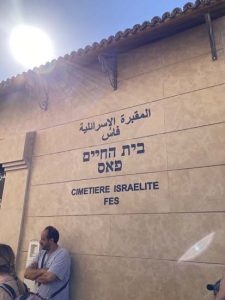 Visiting the Tzadik with special powers and then witnessing something so beautiful and wholesome as the making and serving of Moroccan Mint Tea, felt very special. The juxtaposition between visiting and honoring the dead and then visiting and honoring the living, and both being important places to visit and see as parts of Morocco’s Jewish history, was, I’ll say, mesmerizing and meaningful. I could feel the importance of these visits and felt the warmth of these moments, both literally and figuratively. I continue to reflect on these two moments on the trip and why they were so impactful to me.
Visiting the Tzadik with special powers and then witnessing something so beautiful and wholesome as the making and serving of Moroccan Mint Tea, felt very special. The juxtaposition between visiting and honoring the dead and then visiting and honoring the living, and both being important places to visit and see as parts of Morocco’s Jewish history, was, I’ll say, mesmerizing and meaningful. I could feel the importance of these visits and felt the warmth of these moments, both literally and figuratively. I continue to reflect on these two moments on the trip and why they were so impactful to me.
In our Torah portion this morning, Naso, we read how each tribe brought their offerings to the Mishkan, or Tabernacle. The list goes on and on, and it almost seems never ending.
Right before we learn of the tribe leaders bringing their offerings, or gifts to the Mishkan, we learn the Priestly Blessing, or Birkat Kohanim. How are we to hold this moment of being blessed, knowing that soon we must share our blessings and our gifts? This give and take is one I feel strongly, especially today.
The beauty of being the recipient of so many blessings, yet making sure to not only take those blessings, but give back in my own way with my own gifts. I believe it should always be a continuous cycle.
As I reflected on these verses in Parashat Naso, I realized that I just experienced and witnessed the sharing of so many gifts on this trip. The Berber family opened up their home to offer us not only tea, but an insight into their way of life.
A Moroccan Jewish family opened their home to us for Friday night Shabbat dinner, and spoke to us about their family legacy in Morocco.
An older woman, living alone and now supported by the Joint, welcomed me and others in my group into her home with homemade cookies and tea, and her joy from our visit will forever be in my memory. And of course, our tour educator, Raphael, and our JDC staff on the ground in Morocco, Dorith, welcomed us, taught us, and shared their gifts and talents.
You may see a trend here. We were welcomed into the homes and into the lives of the Moroccan Jewish community.
The Moroccan Jewish community was beyond hospitable, and honestly, it was not only the Jews, it seemed to be everyone. I witnessed the camaraderie and friendship between our tour educator and the people he saw on the street.
We met with non-Jewish tour educators too, and they were beyond friendly and welcoming as well. The deep sense of community was felt, and in a Muslim country, to witness the respect that the community has for Jews warmed my heart. An example of this is even seen on the daily newspaper, where the Hebrew calendar date is listed alongside the secular calendar date!
As our tour educator would say, “what a Mechaya!” And honestly, my response to the whole trip is exactly that. A mechaya is yiddish meaning a real true joy, a bout of pleasure and enjoyment from something. I feel blessed and grateful to have been on this trip and had this experience.
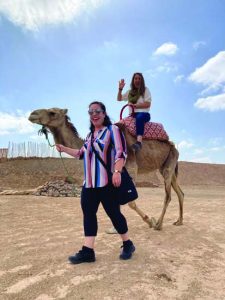 Morocco will forever hold a special place in my heart, and it was because of the gifts that were shared with me during my trip.
Morocco will forever hold a special place in my heart, and it was because of the gifts that were shared with me during my trip.
I think about all the blessings we received on our trip and wondering how I can give back to this amazing place. Being ‘Inside Jewish Morocco,’ gave me a closer look into the lives of Moroccan Jews and all that Morocco has to offer. I hope that many of you will add Morocco to your list of places to travel, visit, and learn more about.
For the Jews around the world, we often send financial support, but we must also visit and show our love by being physically present. I felt that the group I was with had this role; to lift up the spirit of all whom we met and interacted with during our visit.
We were able to bring our own gifts to this experience and to Morocco. It has been a long two years without many tourists to the Moroccan Jewish Community, and this trip felt almost like a homecoming.
Everyone was so happy to see us. And I personally was able to meet family of mine as well in Casablanca, the cousin of my mom’s first cousin, which was quite exciting. Maybe I’ll share more about this another time. And a few of my fellow participants had Moroccan ancestors (my family was married into our family history) which also made it feel like a homecoming for many as well.
I hope and pray that I can continue to be blessed by experiences like this, and that others will be blessed by opportunities like this as well. I aim to give back by visiting those who are supported by the JDC, and continue to support their work with donations and talking about their meaningful and impactful work with all of you.
As you can tell, my trip was miraculous in many ways, and I do not take any part of it for granted. Traveling during a pandemic, especially internationally, is a feat. It’s not an easy thing to do, but I wouldn’t have traded this experience for anything else. (Though of course coming back with Covid was not the best return gift. Thank Gd, I am feeling better, along with many of my fellow trip participants who also caught covid in the last days of this experience).
Many of you follow me on Instagram and/or Facebook, and you saw many of my posts during this trip.
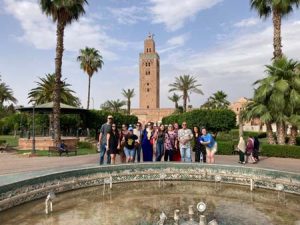 The pictures show the very cool things I got to see, the sites I visited, and pictures with some of the people whom I met and connected with while in Morocco.
The pictures show the very cool things I got to see, the sites I visited, and pictures with some of the people whom I met and connected with while in Morocco.
What you did not see or witness is the warmth and the care of the Moroccan people that I just shared with you from my experience.
As we hold onto the blessings we’ve been given and the gifts of Parashat Naso, I think of the moments of this trip that made it incredibly meaningful and transformative for me.
I would be remiss if I didn’t mention the Richmond Jewish Foundation one more time, and my gratitude for receiving the Sisisky Fellowship. Thank you to them and Temple Beth-El for encouraging me to go on this adventure. This trip would not have been possible without all of your support.
I look forward to sharing more about my time in Morocco in the weeks and months to come.
Shabbat Shalom.









